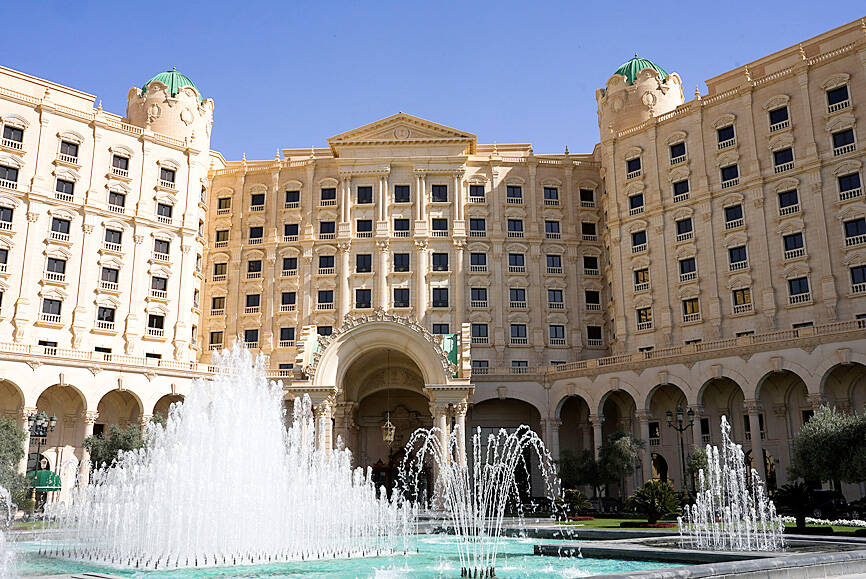Ukraine is ready to proceed with a ceasefire prohibiting attacks on energy infrastructure, Ukrainian President Volodymyr Zelenskiy said late on Tuesday, in line with a deal that was brokered by the US during three days of negotiations with Ukrainian and Russian officials in Saudi Arabia.
Zelenskiy said in a video address that Ukraine had agreed with US negotiators “that a ceasefire for energy infrastructure can start today.”
However, he warned that any strikes on Ukraine’s energy facilities by Moscow would draw “strong retaliation.”

Photo: Reuters
The comments underscored the tenuous agreements that came out of the three days of separate US-Ukrainian and US-Russian talks in Saudi Arabia’s capital, Riyadh.
Washington said that it had agreed with the warring parties to implement a pause on attacks on energy infrastructure as well as taking steps to ensure safe navigation for ships in the Black Sea.
Those talks were part of a broader effort by US President Donald Trump’s administration toward a limited, 30-day ceasefire that Moscow and Kyiv agreed to in principle last week, but has thus far failed to materialize as both sides continue to launch drone and rocket attacks against the other.
While Zelenskiy on Tuesday thanked the US for its efforts to strike an agreement, questions remained over some key details.
The White House said in separate statements that the sides had “agreed to ensure safe navigation, eliminate the use of force and prevent the use of commercial vessels for military purposes in the Black Sea.”
Details of the prospective deal were not released, but it appeared to mark another attempt to ensure safe Black Sea shipping after a 2022 agreement that was brokered by the UN and Turkey, but halted by Russia the next year.
After the White House issued its statement, the Kremlin warned that a potential Black Sea deal could only be implemented after sanctions against Russian Agricultural Bank and other financial organizations involved in food and fertilizer trade are lifted, and their access to the SWIFT system of international payments is ensured.
Zelenskiy called the demands an example of Moscow “manipulating, twisting agreements and lying” about the terms of the agreement.
“There are absolutely clear statements that have been published by the White House, everyone can see what is stated there,” Zelenskiy said. “And there is something that the Kremlin is lying about again: that supposedly the [ceasefire] in the Black Sea depends on the issue of sanctions.”
In an apparent reference to Moscow’s demands, the White House said that the US “will help restore Russia’s access to the world market for agricultural and fertilizer exports, lower maritime insurance costs, and enhance access to ports and payment systems for such transactions.”
When asked about when Washington might help Moscow achieve those ambitions, Kremlin spokesman Dmitry Peskov yesterday said that contacts between Russia and the US “continue quite intensively,” and that authorities are “satisfied with how pragmatic, constructive and productive our dialogue is.”
Peskov said that the 2022 Black Sea Grain initiative could be revived if Russia’s demands regarding agricultural and fertilizer exports are met.

INVESTIGATION: The case is the latest instance of a DPP figure being implicated in an espionage network accused of allegedly leaking information to Chinese intelligence Democratic Progressive Party (DPP) member Ho Jen-chieh (何仁傑) was detained and held incommunicado yesterday on suspicion of spying for China during his tenure as assistant to then-minister of foreign affairs Joseph Wu (吳釗燮). The Taipei District Prosecutors’ Office said Ho was implicated during its investigation into alleged spying activities by former Presidential Office consultant Wu Shang-yu (吳尚雨). Prosecutors said there is reason to believe Ho breached the National Security Act (國家安全法) by leaking classified Ministry of Foreign Affairs information to Chinese intelligence. Following interrogation, prosecutors petitioned the Taipei District Court to detain Ho, citing concerns over potential collusion or tampering of evidence. The

‘FORM OF PROTEST’: The German Institute Taipei said it was ‘shocked’ to see Nazi symbolism used in connection with political aims as it condemned the incident Sung Chien-liang (宋建樑), who led efforts to recall Democratic Progressive Party (DPP) Legislator Lee Kun-cheng (李坤城), was released on bail of NT$80,000 yesterday amid an outcry over a Nazi armband he wore to questioning the night before. Sung arrived at the New Taipei City District Prosecutors’ Office for questioning in a recall petition forgery case on Tuesday night wearing a red armband bearing a swastika, carrying a copy of Adolf Hitler’s Mein Kampf and giving a Nazi salute. Sung left the building at 1:15am without the armband and apparently covering the book with a coat. This is a serious international scandal and Chinese

Seventy percent of middle and elementary schools now conduct English classes entirely in English, the Ministry of Education said, as it encourages schools nationwide to adopt this practice Minister of Education (MOE) Cheng Ying-yao (鄭英耀) is scheduled to present a report on the government’s bilingual education policy to the Legislative Yuan’s Education and Culture Committee today. The report would outline strategies aimed at expanding access to education, reducing regional disparities and improving talent cultivation. Implementation of bilingual education policies has varied across local governments, occasionally drawing public criticism. For example, some schools have required teachers of non-English subjects to pass English proficiency

TRADE: The premier pledged safeguards on ‘Made in Taiwan’ labeling, anti-dumping measures and stricter export controls to strengthen its position in trade talks Products labeled “made in Taiwan” must be genuinely made in Taiwan, Premier Cho Jung-tai (卓榮泰) said yesterday, vowing to enforce strict safeguards against “origin laundering” and initiate anti-dumping investigations to prevent China dumping its products in Taiwan. Cho made the remarks in a discussion session with representatives from industries in Kaohsiung. In response to the US government’s recent announcement of “reciprocal” tariffs on its trading partners, President William Lai (賴清德) and Cho last week began a series of consultations with industry leaders nationwide to gather feedback and address concerns. Taiwanese and US officials held a videoconference on Friday evening to discuss the